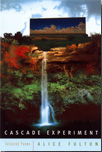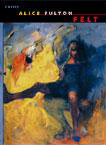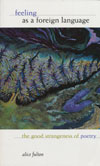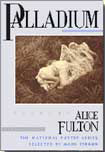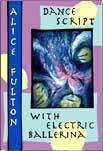
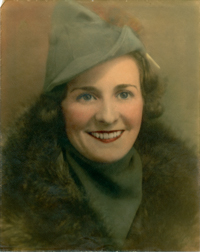
Mary Callahan Fulton
May 21, 1913 – April 26, 2009
A Nightingale of Troy


The Nightingales of Troy
Book Groups
Click here for Reading Group Guide. If your Book Group would like to talk with Alice Fulton by phone conference, please contact Erin Lovett, publicist at W.W. Norton.
Bloggers and Reviewers
If you'd like to review The Nightingales of Troy, please send the name of your publication or blog with your request to Erin Lovett, publicist at W.W. Norton.
Erin Lovett, Publicist
W.W. Norton & Company
500 Fifth Ave.
New York, NY 10110
Tel.: 212-790-4388
Recent Poems Online
“Personal Reactor,”
at Little Star
“Claustrophilia,”
at Poetry Daily
“Triptych For Topological Heart,”
in Poetry
“Personally Engraved,”
“Make It New,” and
“You Own It”
in Poetry
“Forcible Touching”
in Tin House
“Sidereal Elegy”
in The Atlantic
“The Next Big Thing”
in The New Yorker
“After The Angelectomy”
in The Chronicle of Higher Education: Monday’s Poem
“My Task Now Is To Solve The Bells”
in Antioch Review
“Wow Moment,”
“Daynight, With Mountains Tied Inside,” and
“End Fetish: An Index Of Last Lines”
in Poetry
“Barely Composed”
at Huffingtonpost
“Malus Domestica”
in The New Yorker
“Mahamudra Elegy”
in The Atlantic
“Claustrophilia”
in The New Yorker
“A Lightenment On New Years Eve”
in Kenyon Review
Recent Interviews
The New Yorker Interview by Alice Baumgartner
Access Utah Public Radio Interview by Lee Austen
Radio West Moderated by Doug Fabrizio
Albany Times Union Interview by C.J. Lais, Jr.
The L Magazine Interview by Thea Brown
Cornell Chronicle Interview by Daniel Aloi
BookBrowse.com Interview by Karen Rigby
Tish Pearlman, "Out of Bounds" WEOS Geneva, New York
(Real Audio)
Boston Globe "Distilling Decades into Fiction"
Irish Times Magazine "Legends of Troy"
Barely Composed at these Booksellers
United States
amazon.com
barnesandnoble.com
Buffalo Street Books
ibookstore.com
indiebound.org
Market Block Books
Nicola's Books
Open Books
Powell's World of Books
Canada
indigo.com (Canada)
Outside North America
academybooks.co.nz (NZ)
amazon.co.uk (UK)
bol.com (NL)
booktopia.com.au (AU)
imusic.com (Norway)
mightyape.co.nz (NZ)
periplus.com (ID)
The Nightingales of Troy
New & Recommended by The Boston Globe
A Discoveries feature by The Los Angeles Times
Featured Books interview in The Irish Times
Featured in Paperback Row The New York Times
Starred review in Kirkus Reviews
Starred review in Booklist
A Recommended Book on BookBrowse.com
Praised in The New York Times Book Review, The Seattle Times, Cleveland Plain Dealer, Winston-Salem Journal, and elsewhere.
Two stories from The Nightingales of Troy have been chosen for The Best American Short Stories, a third was selected for The Pushcart Prize Anthology.
Click here for photo gallery, the story behind the stories (author comment), and reading group guide,
here for an interactive companion map on Google Maps, and here for a printable PDF companion map.
Excerpts from Reviews
The Nightingales of Troy does not have the feel of a fiction debut; it benefits from Fulton's practiced eye for detail and motion — a woman in a waiting room wears "hair scrunchies like little clown ruffs on her wrists" and punctuates a comment about her childhood in an orphanage by snapping "one of her fluffy bright handcuffs" — and also her ability to move between sentences and paragraphs of prose the way a poet might move between lines and stanzas, with a lyrical lightness.
What sets The Nightingales of Troy apart from so many other precocious debut collections is Fulton's knack for the ineffable, for creating stories that are more than the sum of their intricately assembled parts. Her best stories not only exhibit her architectural prowess, they also remind the reader of the near-magical capaciousness of the story form. "The Real Eleanor Rigby," for example, combines a high-school girl with interests in Catholic mysticism, Herman Melville, and the Beatles; her overbearing mother; an encounter with the Fab Four themselves; and a possible tab of acid, accidentally ingested — and does so in a way that illuminates, by the story's end, a portion of the mysterious depths of the parent-child bond.
It's this striving after mysteries that lends the collection its unusual power. Though many of these stories are the products of a great deal of historical research, Fulton is interested in getting at things far more slippery than facts: the bequeathings of mothers to daughters, of one generation to the next, of our memories to our hopes. The book's multigenerational sweep brings with it a keen awareness of the fragility of the body — of mortality — and Fulton's women are all quietly eloquent on the subject of their disappointments. Yet The Nightingales of Troy is also a chronicle of resilience. Through it all-from Mamie's dangerous pregnancy in "Happy Dust" to the close of the twentieth century and the collection's bittersweet and deeply satisfying final lines — a residue of hope, that other happy dust, remains.”
Greg Schutz
The Fiction Writers Review
full text at The Fiction Writers Review
“With The Nightingales of Troy: Stories of One Family’s Century, her outstanding first fiction collection, poet Alice Fulton reveals herself to be triumphantly at home in the short story. Spanning the 20th century — from a farm birth in 1908 to an MRI in 1999 — Fulton’s stories are sublime distillations, not only of the individual lives they so eloquently describe, but also of the eras throughout which the formidable Garrahan family endures.”
Anna Mundow
The Boston Globe
full text at The Boston Globe
New & Recommended by The Boston Globe Editors
“You can’t fake quirkiness; it requires soul. It requires a rousing familiarity with language… the roots of words. Alice Fulton is a poet…; here she is writing her first novel…. Boy, oh boy, was it worth waiting for! Four generations of Garrahan women are placed before us, blessed and cursed, saints and lost souls.
Words like ‘vamoose’ and ‘rigmarole’ and ‘hotsy-totsy’ roll around like bright spots in that dark, early 20th century landscape, tinged with harsh weather and enough death and disease to make Angela’s Ashes look like a comic valentine. Choking, childbirth, fevers, drowning, pneumonia were just a few of the causes of untimely death.
The Garrahan women meet their fates head-on. Through some sleight of hand, Fulton lets us know them from the outside and the inside, both. ‘Happiness,’ thinks Mamie, the mother you’d want on a desert island, ‘is nothing but God’s presence in the silence of the nerves. And though my children were sleeping the sleep of the just, I half believed my unvoiced thoughts would reach them across that room full of twentieth-century light.’ ”
Susan Salter Reynolds
Los Angeles Times Book Review
full text at The Los Angeles Times
A Los Angeles Times “Discoveries” feature
“The family motto is ‘Nothing ventured, nothing lost.’ But the Garrahan women do sometimes venture — and gain. Though they may seem estranged from one another, their familial bond brings depth and meaning to their experiences. Fulton is an award-winning poet, so it should come as no surprise that vivid descriptions abound. In one story, the narrator describes her aunt as a woman who ‘always seemed to be wearing gloves whether she was or not.’ Another aunt, she observes, ‘usually looked a little puzzled, like somebody trying to do arithmetic in dim light.’ If this collection is any indication, Fulton may be firmly establishing herself in a different genre. It’s exciting to watch … as she finds the right threads with which to create nuanced fiction, firmly bound.”
Sarah Fay
New York Times Book Review
“Alice Fulton’s collection of short fiction, The Nightingales of Troy, vividly infuses 10 stories of the members of a New York state Irish clan with humanity, humor and nuance… a trademark compassion that runs through generations.
In ‘Happy Dust’ we meet Mamie Flynn Garrahan, a 26-year-old farming woman…. Mixing dry wit with a knowing sense of the foibles of human character, Fulton creates a funny, spirited tale of the powers of self-reliance. Peg Flynn, the heroine of ‘Queen Wintergreen’ …must weigh a marriage proposal with her own sense of self. Here Fulton presents a quiet study in dignity and the family pressures the young can direct against the old…. As decades move ahead, Garrahans reappear, older and not necessarily wiser. Now the stories are told by their children, who are often appalled by their parents’ behavior.
In the brilliantly comic ‘The Real Eleanor Rigby,’ teenage Ruth Livingston and her best friend Sunny win a local radio contest and get to visit the Beatles’ dressing room at New York’s Shea Stadium. Unfortunately for Ruth, her irrepressible mother, Annie, is her escort. When Annie Garrahan Livingston meets the Beatles, amazing things happen that send poetic, intellectual Ruth (along with the Beatles, she’s addicted to Melville) to the heights of humiliation and happiness.
After spending time with the Garrahans, you know that the Garrahans of the future will be just as conflicted, hopeful, tragic, witty… as their predecessors. You also will know that Alice Fulton is a writer who can provide the complicated pleasures of accomplished fiction. ”
Richard Wallace
The Seattle Times
full text at The Seattle Times
“In Alice Fulton’s story collection, The Nightingales of Troy, the sentences are songbirds. They chirp and charm throughout…. In 10 rich and dense stories, one for each decade of the 20th century, we see four female generations struggle and search for hope in and around Troy, N.Y…. Quirky characters look for love and then try to survive what they’ve found…. They deal with children and the shadow of death. Sometimes tragedy hits, and sometimes they find a spark of happiness. A few even meet the Beatles…. One character wants to stage a water ballet dedicated to Florence Nightingale — hence the book’s title — but the conceit of elegant and out-of-place birds in upstate New York resonates on several metaphorical levels…. You can meditate over this prose, which sparkles with soul and wit.”
Daniel A. Hoyt
The Cleveland Plain Dealer
“These beautiful connected stories feature several generations of good Catholic women in upstate New York. Ruth is introduced in the 1960s as ‘the loneliest girl in North America…. the only Catholic High student who subscribed to Zen Teen, the Journal of Juvenile Macrobiotics.’ In the perfectly titled final story, ‘L’Air du Temps,’ Ruth sniffs the complicated scent of her mother’s mortality. That story and this collection end with a subtle and sure emotional impact….”
Barbara Fisher
The Boston Globe
“Impressive…admirable…. It is about Catholics in Troy, New York — but it is about Catholics in Troy, New York, only in the sense that Kafka's “The Metamorphosis” is about middle-class life in early-twentieth-century Prague…. To see that story as primarily about its time and place would be to diminish it. In Fulton’s work as well, time and place are of interest for themselves, but even more because they work so well with the metaphors, images…. Secondhand relics, throughout Fulton’s strange, chewy, immensely likable book, are perhaps more significant than the saints who touched them. Fulton’s stories…are like objects left when somebody dies: they are unkillable…and surprisingly moving.”
Alice Mattison
The Yale Review
“ … These stories relate the history of the Garrahan women and the town of Troy through the progression of the 20th century. The events in each one happen about 10 years apart.… Read as a whole, they give a richer glimpse into the world of the Garrahans than a linear novel might have. The collection reflects Fulton’s skill as a poet. The language is precise and evocative.… The stories are equally well crafted, playing off and enhancing the meaning of one another. People and places resurface… but in such a clever, understated manner that the references never seem contrived. The collection also comes full circle, beginning and ending in the world of medicine and mortality.… But in spite of their focus on illness and death, many of the tales are bravely optimistic. They remain hopeful without ignoring the realities of loneliness and loss. ”
Tracy V. Wilson
Winston-Salem Journal
full text at Winston-Salem Journal
 “Every element in this collection of scintillating linked short stories is surprising, pleasurable, and stealthily affecting. In her first fiction title, Fulton, a MacArthur fellow best known for her poetry, traces the female line in an Irish Catholic family living in her hometown of Troy, New York. The ‘Nightingales’ (as in Florence Nightingale) is the name bestowed on the nurses in the Garrahan sisterhood — which also includes a waitress, a Melville scholar, true-grit mothers, and stalwart spinsters — by a marvelously theatrical, hard drinking priest. The book opens in 1908 with a do-it-yourself childbirth story, and the final tale, a daughter’s good-bye to her mother, takes place in 1999. In between, Fulton displays extraordinary verve in the originality of the predicaments she creates for her irresistible characters, her evocation of the majesty of the land and the rise and decline of the town, and her ravishingly inventive language. Drawing brilliantly on the vernacular and ambience of each decade, Fulton orchestrates richly hilarious stories revolving around the sinking of the Ship of Joy, an accidental acid trip with the Beatles, and crazy battles over a burial dress, an exceptionally neurotic freeloader, adored pets, and the ‘Glorious Mysteries.’ ”
“Every element in this collection of scintillating linked short stories is surprising, pleasurable, and stealthily affecting. In her first fiction title, Fulton, a MacArthur fellow best known for her poetry, traces the female line in an Irish Catholic family living in her hometown of Troy, New York. The ‘Nightingales’ (as in Florence Nightingale) is the name bestowed on the nurses in the Garrahan sisterhood — which also includes a waitress, a Melville scholar, true-grit mothers, and stalwart spinsters — by a marvelously theatrical, hard drinking priest. The book opens in 1908 with a do-it-yourself childbirth story, and the final tale, a daughter’s good-bye to her mother, takes place in 1999. In between, Fulton displays extraordinary verve in the originality of the predicaments she creates for her irresistible characters, her evocation of the majesty of the land and the rise and decline of the town, and her ravishingly inventive language. Drawing brilliantly on the vernacular and ambience of each decade, Fulton orchestrates richly hilarious stories revolving around the sinking of the Ship of Joy, an accidental acid trip with the Beatles, and crazy battles over a burial dress, an exceptionally neurotic freeloader, adored pets, and the ‘Glorious Mysteries.’ ”
Donna Seaman
Booklist starred review
 “In 1908, Mamie Flynn Garrahan is facing a difficult birth…. A farmwife, Mamie doesn’t take any nonsense, and her stolidly candid, perspicacious-yet-nonjudgmental voice is one of the great pleasures of this pleasing collection. Fulton offers a complete group portrait of the Garrahan women. As she follows this family through the 20th century, the author changes her tone and her narrative tactics to allow each character to emerge as her own fully realized self. "Queen Wintergreen" is the story of Mamie’s mother, contemplating widowhood, her place in her son’s crowded household and an unexpected marriage proposal. By telling Peg Flynn’s tale in the third person, Fulton is able to offer external observations, but she also allows Peg to retain some mystery. Other stories call for other accents. In "Dorothy Loves Maleman," Fulton demonstrates that she is just as convincing giving voice to a schizophrenic as she is at creating prodigiously sane characters like Mamie. Different perspectives emerge as characters move through each others' stories, and, while each entry works on its own, the readers’ experience of these women is enriched by viewing their lives together. Fulton has a poet’s economy of language and an ability to choose discerning details. Emotionally satisfying and extremely well-crafted short fiction.”
“In 1908, Mamie Flynn Garrahan is facing a difficult birth…. A farmwife, Mamie doesn’t take any nonsense, and her stolidly candid, perspicacious-yet-nonjudgmental voice is one of the great pleasures of this pleasing collection. Fulton offers a complete group portrait of the Garrahan women. As she follows this family through the 20th century, the author changes her tone and her narrative tactics to allow each character to emerge as her own fully realized self. "Queen Wintergreen" is the story of Mamie’s mother, contemplating widowhood, her place in her son’s crowded household and an unexpected marriage proposal. By telling Peg Flynn’s tale in the third person, Fulton is able to offer external observations, but she also allows Peg to retain some mystery. Other stories call for other accents. In "Dorothy Loves Maleman," Fulton demonstrates that she is just as convincing giving voice to a schizophrenic as she is at creating prodigiously sane characters like Mamie. Different perspectives emerge as characters move through each others' stories, and, while each entry works on its own, the readers’ experience of these women is enriched by viewing their lives together. Fulton has a poet’s economy of language and an ability to choose discerning details. Emotionally satisfying and extremely well-crafted short fiction.”
Kirkus Reviews
starred review
“…For all the book’s poetic merits, it also stands on its own as a selection of stories spanning the lives of seven memorable women…. Some of the women’s voices are heard only once, while others, like Charlotte, become essential players…. Some stories can be read as companion pieces. ‘Queen Wintergreen’ touches on aging, as does ‘L‘Air Du Temps.’ A nurse in the title story later becomes a patient. One story features birth, another, death. The most powerful of these pairings — ‘A Shadow Table’ and ‘Centrally Isolated’ — hammer one of the more heartbreaking points home: ‘you could get hurt while serving others.’ … This combination... of service and independence, sainthood and aplomb, appears throughout the book. The differences between the more subdued women and their more take-charge counterparts provide rich material for social and psychological inquiries.
The world presented here is a dark one, punctuated as it is with madness, a drowning, hospitalization, unfulfilled desires, and an unhappy marriage, but realism is never used for the sake of preventing nostalgia, and never overwhelms. Moments of genuine humor are juxtaposed with seriousness. Though you may find yourself wishing the characters would emerge unscarred, happiness is not found in the avoidance of pain. It’s found, wisely, in the midst of it — through the loyalty of sisterhood and through the honoring of the past as an ever-present force.
Alice Fulton’s debut would appeal to any reader fascinated by the evolution of women's roles throughout the past, or to those who enjoy stories about love in its many guises. The stories succeed beautifully in drawing the world inhabited by these ‘Nightingales of Troy,’ who, like Florence Nightingale, minister to those around them.”
Karen Rigby
BookBrowse.com
full text at BookBrowse.com (membership required)
A BookBrowse.com Recommended Book
“Alice Fulton is best known as an acclaimed American poet, but her first collection of short stories, The Nightingales of Troy , cements her place as a first-class fiction writer.
With a natural sense for narrative and for the peculiar, Fulton constructs a thoughtful framework to connect her main characters. While the Garrahan women endure as individuals, history, genealogy and a curious connection to the proposition of sainthood bind them together. The sainthood Fulton investigates is rife with transgression, earthly stumbling blocks and stubborn love. The Garrahans deal with questions of sacrifice and self-preservation, of persevering as individuals while bearing the weight of the past and the forces of fate and personality.
Fulton’s prose thrives on the tactile, and, as in her poetry, the language is brilliantly precise. While often rooted in the physical, Fulton’s narration frequently moves beyond the immediate, both powerfully and subtly. For a writer who has accomplished so much in another genre, it’s a very happy (if not altogether surprising) thing that Fulton’s fiction is as perceptive and rich as her verse.”
Thea Brown
L Magazine
“These 10 linked stories by MacArthur fellow Fulton track the lives of four generations...creating a colorful patchwork of the 20th century. Fulton’s strengths are in elaborate detail and delicate construction....providing the tension at the heart of a book that’s rich with feeling for its characters yet willing to expose their faults.”
Publishers Weekly
“Set in Troy, New York, this debut novel by acclaimed poet Fulton uses ten linked stories to show how the Garrahan women have struggled with triumph and tragedy over a century. A delightful blend of history and storytelling….”
Donna Bettencourt
Library Journal
“…The poet’s new fiction collection keeps beautiful misery in the family as it follows the experiences of four generations… in Troy, N.Y. Nightingales opens fittingly in 1908 with Mamie Flynn Garrahan pushing through childbirth in ‘Happy Dust.’ Mamie’s only aides are her twisted sister-in-law Kitty, who is more concerned with her daily ingestion of arsenic than with the new life; a doctor whose fix-all is Bayer Heroin; and a shunned nun who grows opium poppies. But the odd characters to be found in Troy don’t stop there. In ‘Shadow Table,’ a waitress is given an odd order to fill for her lover’s deceased younger sister. And in ‘The Real Eleanor Rigby,’ we meet a girl who is well rounded in her equal obsession with the Beatles and Herman Melville. These women are made flesh by Fulton’s sharp attention to detail…. Her characters are as imperfect as the world around them and the times they live in. And Nightingales is all the better for their faults and resulting tension. In a collection where 10 is the magic number, time is circular, the past inescapable… Although not overbearingly so, time is Nightingales most overt theme. Beginning with life and ending with death, the collection reflects on life’s general ups, downs, U-turns — and a family’s generational do-overs and last hopes.”
Rose Gorman
Ithaca Journal
advance praise
“In this tour de force collection, Fulton’s lyrical gifts couple with a powerful narrative to bring us the gloriously unexpected Garrahan sisters. This is a book you’ll place alongside Alice Munro and Grace Paley for the rich humor and psychological acuity, the stories of fracture and healing: the smallest things that grace us.”
Jonis Agee
“What a pleasure to move through Alice Fulton’s rich and layered Troy, to meet the members of this eccentric family and delve into their lives! A lovely and illuminating collection.”
Andrea Barrett
“Here are ten beautiful, startling, tightly-raveled stories about memory, family, and time. Each narrative haunts the other nine. The Nightingales of Troy offers a marvelous example of how connected stories can, sometimes more effectively than a novel, evoke generations, individual histories, and the appallingly short, precious gifts that are our lives.”
Anthony Doerr
“This gorgeous collection will surprise you on every page. The voice is vivid, the prose perfect, and the characters unforgettable. I loved it.”
Karen Joy Fowler
“Alice Fulton tells fabulous stories. A book of laughter and tears.”
Maxine Hong Kingston
“Alice Fulton’s wonderful new collection of linked stories about four generations of Irish-American women is comic and tragic, marvelously observed and deeply moving. The Nightingales of Troy should establish her as not only a gifted poet, but one of the best writers of fiction working today.”
Alison Lurie
“With The Nightingales of Troy, Alice Fulton makes her debut as one of the most exciting voices in contemporary fiction. These linked stories read like a novel about a family and community, a window on the past hundred years, rewarding the reader sentence by sentence. At times hilarious, at times heart-breaking, these lives will stay in your mind and delight long after you finish the last page.”
Robert Morgan
“A world is brought blazingly to life in Alice Fulton’s elegant, wise stories. These women are bound by their bodies (glory, solace, and downfall) as well as their time and place. And yet there’s love — and revelation. A brilliant collection.”
Lee Smith
Set in Troy, New York, this linked collection of stories follows a quirky and resilient family throughout the twentieth century. (July 2008.)
In 1908, Mamie Garrahan faces childbirth aided by her arsenic-eating sister-in-law Kitty; a nun who grows opium poppies; and a doctor who prescribes Bayer Heroin. “In the twentieth century, I believe there are no saints left,” Mamie remarks. But her daughters and granddaughter test this notion with far-reaching consequences. Kitty’s arsenic reappears sixty years later in the hands of her distraught niece. A schoolgirl’s passion for The Beatles and Melville—a passion both lonely and funny—shapes her life. Each decade is illuminated by endearingly eccentric characters: an anorexic waitress falls for a wealthy college boy in the jazz age, an exuberant young nurse questions science during the Depression, a homely seamstress designs a scandalous dress in the 1950s.
The Nightingales of Troy, the first fiction collection by an acclaimed American poet, creates a vividly palpable sense of time and place. Fulton’s memorable characters confront the deepest dilemmas with bravery and abiding love.
Alice Fulton’s honors include a MacArthur Fellowship and The Editor’s Prize in Fiction. Her work has been chosen for Best American Short Stories and The Pushcart Prize Anthologies. She lives in Ithaca, New York, and teaches at Cornell.
Click here for Reading Group Guide, and here to read more about Alice Fulton.



